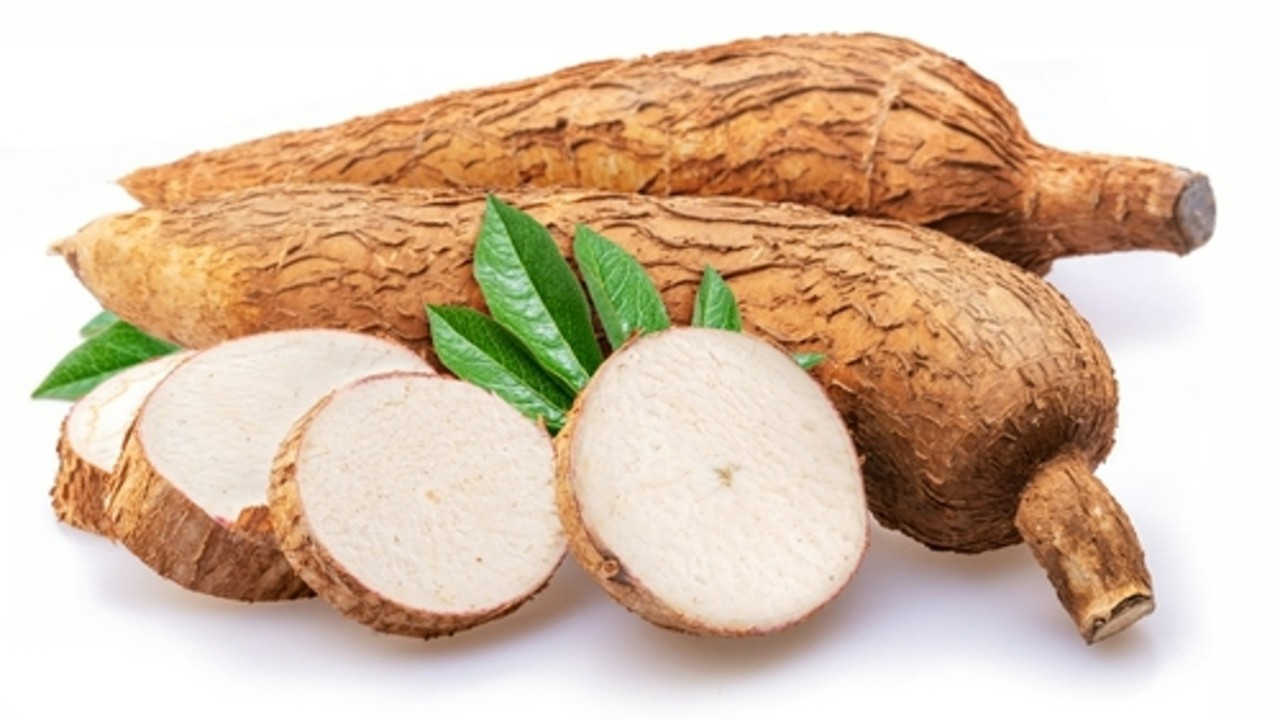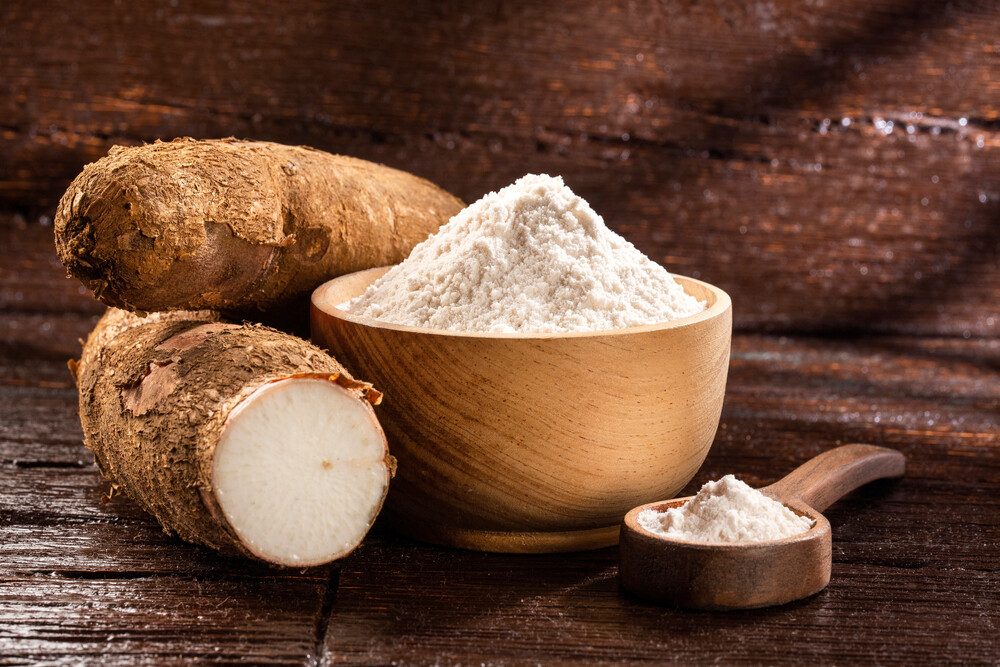Top 13 Benefits of Cassava for Health, Skin, And Hair
Introducing the health and beauty benefits of cassava — a root vegetable with wide culinary & therapeutic applications. Know how to use it and reap all its health benefits.

Nature has provided us with many vegetables, fruits, and herbs with therapeutic properties, and cassava is one of them. Many healthcare experts advocate for the health benefits of cassava and suggest including this starchy vegetable in your diet for all good reasons. It is widely consumed throughout the world. Though the tuberous vegetable is considered beneficial for your health and beauty, eating it in moderation and in the right way is the key to reaping its potential benefits. Like any other food, going overboard with cassava may lead to unexpected side effects. Understand its preparation, how to use and precautions to be taken while consuming this healthy food for overall health and beauty benefits. Scroll down!
What Is Cassava?
Cassava is a tuberous vegetable and is widely cultivated in countries like Thailand, Indonesia, and Nigeria. The oblong, starchy vegetable can be combined with a variety of other vegetables such as carrots, green peas, radishes, capsicum, and many others to prepare delectable recipes. Besides, cassava flour and starches share a crucial role in the food and non-food industry (1).
While dry cassava powder is easily available at grocery stores, finding fresh cassava plants is difficult because the raw tubers and parts of the plant tend to rot very easily. Apart from the tubers, the leaves of cassava are also used for cooking (2).
However, the young cassava leaves are said to be less nutritious than other leafy green vegetables. Cassava plants need a suitable climate to thrive but the best part is that it is low-maintenance and can grow even in the soil with low nutrients.
Cassava comes in two varieties — sweet and bitter. The bitter version contains a higher level of cyanide and needs to be washed thoroughly under running tap water to remove all the toxins. Also, it needs to be crushed before cooking (3). You can also sun dry the roots of cassava and grind them into flour to prepare different dishes. People with food allergies may use cassava flour as a safe alternative to other starches as it is free from gluten, nuts, and grain.
As per Mary Sabat, a renowned nutritionist and certified trainer at Bodydesigns Ltd., cassava flour is generally considered safe to eat when it is properly processed and prepared. However, there are a few important considerations to keep in mind.
She adds, “Cassava is a starchy root vegetable that is a staple food for millions of people in tropical regions. It contains both beneficial and potentially harmful components. The plant itself contains cyanogenic glycosides, which are natural compounds that can release cyanide when ingested. To make cassava flour safe for consumption, it undergoes extensive processing methods such as peeling, soaking, fermenting, and cooking, which significantly reduce the levels of these compounds.
Commercially available cassava flour usually undergoes processing to eliminate any residual cyanide. However, it's essential to ensure that the cassava flour you consume comes from a reliable source and has undergone proper processing to ensure safety. If prepared correctly, cassava flour can be a nutritious and safe alternative to wheat flour for individuals with gluten intolerance or those following a grain-free diet.”
Nutritional Value of Cassava

Before we begin counting down the best health benefits of cassava, let’s first take a look at its nutritional profile.
A 100-gram (3.5 ounce) serving of cassava provides around 191 calories. Around 84% of the total calories come from carbohydrates and the rest comes from proteins and fats. According to the U.S. Department of Agriculture, 100 grams of cooked cassava contains the following nutrients (4).
- Calories: 191
- Protein: 1.5 grams
- Fat: 3 grams
- Carbs: 40 grams
- Fiber: 2 grams
- Vitamin C: 20%
- Copper: 12%
- Thiamine: 7%
- Folate: 6%
- Vitamin B6: 6%
- Potassium: 6%
- Magnesium: 5%
- Niacin: 5%
Cassava comes densely packed with vitamin C and antioxidants that may help promote collagen synthesis in the body, boost immunity, and promote overall wellness (5). Besides, appreciable amounts of copper, one of the top nutrients in cassava may improve the activity of neurotransmitters, energy production, iron metabolism, and many others (6).
Amazing Health Benefits of Cassava
Cassava is a rich source of many crucial nutrients required by the human body to carry out several functions. Here is a list of the top health benefits of eating cassava regularly.
1. May Help Improve Gut Health
Cassava is packed with resistant starch, a type of starch that has properties similar to soluble fibers and aids digestion. Including foods that are rich in resistant starch may improve your health in several ways. The starch found in cassava is said to feed the bacteria in the gut and help improve digestive health by reducing inflammation in the gut (7).
2. May Help Lower the Risk of Diabetes
According to a few studies, eating cassava in moderation may help in blood sugar management and improve the feeling of satiety (8), (9).
3. May Help Boost Immunity
According to our contributor Mary Sabat, cassava is a good source of several essential nutrients, including dietary fiber, vitamin C, and certain B vitamins. These nutrients play important roles in maintaining overall health and supporting immune function. A strong immune system relies on a well-balanced diet that includes a variety of nutrient-rich foods, including cassava, along with other fruits, vegetables, lean proteins, and whole grains.
Cassava comes fortified with vitamin C, a vital nutrient that may help improve immune health. The humble vitamin is said to fight oxidative stress in the body and improve the functions of immune cells, thus safeguarding you against a variety of allergies, infections, and diseases (10).
4. May Improve Skin Health
Vitamin C in cassava helps boost collagen synthesis in the body, thus helping improve the skin’s elasticity and texture (11). Besides, the peel of cassava fruit acts as a natural skin exfoliator and may help remove a layer of dead skin cells. The tuberous vegetable is also said to lighten dark spots and hydrate the skin.
5. May Help Relieve Headaches

Most of us suffer a headache at some point in time and sometimes, it becomes unbearable. Here, cassava can come to your rescue. To relieve the headache, you can prepare juice by soaking 60 grams of cassava roots in water for a few hours and then blending it in a mixer and drinking it 2 times a day. Also, make sure to make the juice fresh every time for the best health benefits.
(Disclaimer: Soaking cassava is extremely important as it contains a high level of cyanide and may cause toxicity when ingested. Soaking and cooking cassava reduces the amounts and potency of harmful compounds in it and makes it much safer for human consumption).
6. May Lower the Risk of Cancer
An impressive benefit of including cassava in your diet is that the active compounds in the starchy vegetable may help lower the risk of serious health disorders such as cancer (12). Vitamin B17 found in the young leaves of cassava helps stimulate red blood cell production in the body and reduce the risk of cancer.
7. May Aid in Weight Management

Excess body weight can lead to several health problems. Eating cassava or cassava bread in moderation may help you control body weight (13). It is because cassava has restricted starch and renders a feeling of satiety, eventually allowing you to eat less and manage body weight.
8. May Help Relieve Symptoms of Rheumatism

Rheutamic disorders such as rheumatoid arthritis, spondylitis, and lupus target bones, muscles, and joints in the body, thus making body movements painful and discomforting. Cassava leaves come enriched with appreciable amounts of magnesium, a mineral that helps lower blood pressure and reduces the risk of rheumatic disorders (14).
Cassava fulfills around one-third of your daily magnesium requirement and provides therapeutic benefits.
9. May Aid in Wound Healing
Cassava is known for several therapeutic benefits, including its ability to speed up wound healing. An animal study mentions that cassava hydrogel may speed up skin cell repair and wound healing (15).
10. May Help Promote Healthy Pregnancy

During pregnancy, a woman needs a high amount of folate and vitamin C (16). In fact, they are prescribed to take these two vital nutrients right from the early stages of pregnancy. Since these two nutrients are found in cassava, eating it in the right concentration may help maintain a healthy pregnancy. A cup serving of cassava leaves can fulfill upto15 percent of your daily folate and 47 % of your daily calcium requirement.
11. May Help Lower the Risk of Malnutrition
Cassava leaves are densely packed with lysine protein which makes them a natural remedy to fight kwashiorkor — a type of malnutrition caused by protein deficiency in the diet (17). However, ensure to thoroughly wash and cook cassava leaves before consuming them to reap maximum health benefits.
12. May Improve Eye Health
Cassava leaves contain high amounts of vitamin A. This essential vitamin helps maintain corneal health and promotes healthy functions of the retina (18). The active compounds in cassava leaves help lower the pace of age-related macular decline and promote healthy vision power.
13. May Boost Hair Growth

Hair fall is a common problem that affects almost everyone at some point in time. The active nutrients such as vitamins and minerals in cassava leaves and stem provide much-needed nutrition to your hair follicles and may help prevent hair fall (19).
How to Use Cassava to Reap All the Health Benefits
Cassava shares versatile culinary use and therapeutic applications. You can prepare soups or relishing stews using different parts of the plant. Since it is a starchy vegetable and contains a thick consistency, the soups, and stews made using cassava are generally filling and healthy.
To use cassava for faster wound healing, you can crush some cassava leaves with a tablespoon of fresh aloe vera gel to make a smooth paste. Apply a thin coat of this paste to the wound. The stem of the cassava plant can also be used to heal wounds. If there is a wound due to a skin burn, you can squeeze the pulp of the cassava fruit and apply this to the wound every day.
You can combine the paste of tuber with honey, olive oil, or honey to prepare a natural face mask and reap the best skincare benefits.
Word of Caution
While starchy vegetables pose many health benefits, they can show serious side effects upon overconsumption or not using them the right way. Here are a few tips you must consider before using this nutrient-rich vegetable.
Cassava comes packed with an active compound linamarin. When eaten uncooked, this toxin gets converted into cyanide in the body and can cause extremely serious side effects. In certain cases, a higher level of cyanide may even lead to death (20).
Since cassava roots tend to rot quickly, it diminishes its nutritional profile. Besides, eating rotten roots may also lead to fungal and bacterial infections.
The harmful substances in cassava may negatively impact the functioning of the liver, kidney, and pituitary gland.
Now that we know the downsides of eating cassava, you should not be scared of using this tuberous veggie for culinary or therapeutic purposes. If you peel, thoroughly wash and precisely cook cassava, it is safe for use and you may reap several health benefits from it.
Conclusion
Cassava is a starchy root vegetable that is admired in the healthcare industry for the health benefits it offers. Native to Asian countries, root vegetables make a rich source of essential nutrients and a natural remedy for blood sugar control, skin and hair care, digestive troubles, and weight issues. Some other health benefits of cassava include improved eye health, management of rheumatism, and healthy pregnancy. Apart from its therapeutic benefits, people in many countries use all parts of the vegetable to make soups and stews that are filling and help keep hunger pangs at bay.
However, you must take special precautions before using this root vegetable to avoid certain side effects. Washing and cooking cassava before consuming it is extremely crucial as it contains linamarin that gets converted into cyanide in the body when eaten raw. Besides, rotten roots of the vegetable may lead to bacterial and fungal infections. But, once thoroughly washed and cooked, the tuberous veggie offers a plethora of health benefits and promotes overall wellness. If you too are looking to make your diet much more flavorful and healthy, include this tuberous veggie in your favorite recipes and embark on a journey to good health.
Contributor:
Mary Sabat, Nutritionist and Ace Certified Trainer, Body Designs by Mary





 JOIN OUR WHATSAPP CHANNEL
JOIN OUR WHATSAPP CHANNEL






















































